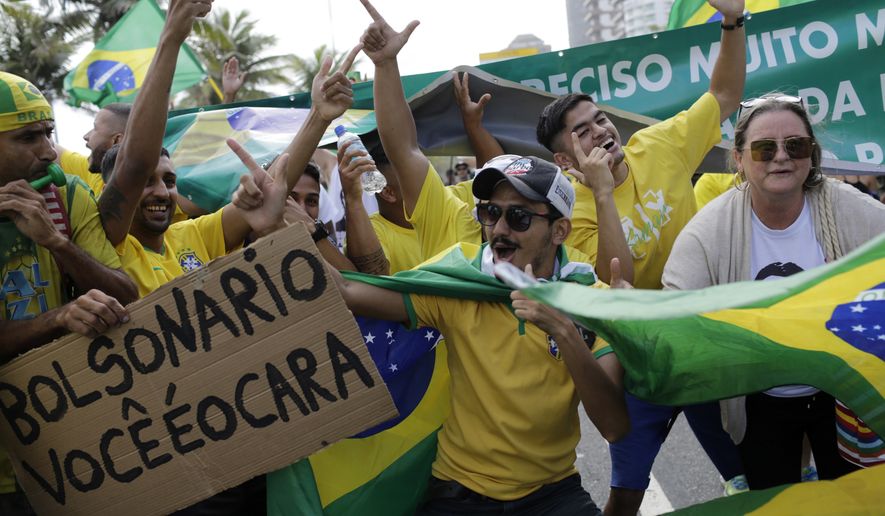Brazilians on Sunday elected as their 38th president Jair Bolsonaro, the conservative firebrand whose anti-establishment message resonated with an electorate worn out by years of scandal.
Within moments of the polls closing, exit polls and projections confirmed Mr. Bolsonaro’s triumph which, though expected in final days of the victory, is sure to rock Brazil’s political class.
With almost 99 percent of votes counted, the candidate of the fringe Social Liberal Party came in at 55.3 percent of votes, while his Workers’ Party opponent, Fernando Haddad, captured 44.7 percent. The difference amounts to almost 11 million votes.
Early in the evening, as thousands of his supporters celebrating outside his house in Rio de Janeiro’s posh Barra de Tijuca neighborhood, Mr. Bolsonaro took to video streaming — his trademark channel — to thank voters, tout his “governability” and slam his media critics.
“We have everything to be a great nation,” he said after citing a Bible verse in an apparent nod to key backing from evangelical groups. “Together, together we will change Brazil’s destiny.
Later appearing outside his residence and reading from a lengthy prepared statement, Mr. Bolsonaro — who has embraced his “Brazil’s Trump” moniker — said he would “break paradigms” and make his country’s foreign policy “non-ideological.
In an evening news conference, a defiant Mr. Haddad acknowledged his defeat but failed to congratulate his opponent or even mention him by name. The leftist candidate instead promised a spirited opposition to “guarantee [our] institutions.”
Mr. Bolsonaro’s triumph marks the end of a dramatic campaign that, in a matter of weeks, saw the seven-term congressman rise from pesky fringe candidate to all-but-unbeatable front-runner.
The 63-year-old’s numbers shot up in mid-September when the courts vetoed former President Luiz Inacio Lula da Silva’s candidacy over his 12-year sentence on corruption charges. Until then, the iconic Workers’ Party founder had been the clear leader in the polls.
But Mr. Haddad, his replacement, tried to tap into considerable anti-Bolsonaro sentiment but ultimately proved unable to replicate Mr. da Silva’s traction and, worse, came to be viewed as a symbol of a corrupt establishment and a party drunk on power.
And after trailing his rival by nearly 17 percentage points and coming in a distant second in the Oct. 7 first round, the former Sao Paulo mayor failed to narrow the gap enough to lure Mr. Bolsonaro into a true head-to-head debate, televised or otherwise.
Still, Mr. Bolsonaro should know that Sunday’s vote was less a referendum on him than on the Workers’ Party, known by its Portuguese initials PT, Paulo Roberto de Almeida, who leads the Brazilian foreign ministry’s IPRI think tank, told The Washington Times.
“A large part of the votes that gave Mr. Bolsonaro the victory were not pro-Bolsonaro but anti-PT votes,” Mr. de Almeida said. “Much of what happens [now] will depend on whether the party adopts an aggressive attitude — or whether it pauses for a reflection.”
The winner’s controversial proposals and firebrand rhetoric — Mr. Bolsonaro has, at various times, spoken out in favor of torture, forced sterilizations and military rule — will likely put opposition leaders under intense pressure to stir away from any post-election detente.
“I see a Brazil of high tension, polarization, animosity, conflict, fake news — in a word, with rising tensions,” Mr. de Almeida said, cautioning that the post-election calm may not necessarily extend to both sides.
“I don’t know how [Mr. Bolsonaro’s opponents] will react — if they will be confused, frustrated, depressed,” he said, “or if they will retreat into a campaign of hostility, talking fascism, Nazism, racism, xenophobia, homophobia.”
And amid the election of two of Mr. Bolsonaro’s sons to Brazil’s House and Senate, respectively, critics like Jose Paulo Bandeira, a political scientist at Rio de Janeiro Federal University, are already warning of what they view as nepotism and oligarchy.
“There is a political desire to implement a presidential dictatorship,” Mr. Bandeira said. “It’s the Bolsonaro family that will govern Brazil.”
But while Mr. Bolsonaro undoubtedly cultivated a rough, anti-establishment image, caricaturing him as a “fascist” is simply untrue, Mr. de Almeida countered.
“In truth, he could be called an ’opportunist,’” he said. “He felt a change in the flow of opinions, a need for a representative of conservatism — of certain values and concrete questions like security and anti-corruption.”
In addition, the transition period until Jan. 1, when he will be sworn in to replace outgoing President Michel Temer, now gives Mr. Bolsonaro time to “reconfigure” and soften some of his more extreme talking points and positions, Mr. de Almeida noted.
His challenge, he said, will be to get a team made up of military brass and nonestablishment figures up to speed to actually run South America’s most populous nation, which urgently needs an overhaul of its troubled tax, pension and healthcare systems.
“The Brazilian government is a huge government, and all of this will be very haphazard,” Mr. de Almeida said. “Before March or April, it will be very difficult to have an administration that works normally.”




Please read our comment policy before commenting.